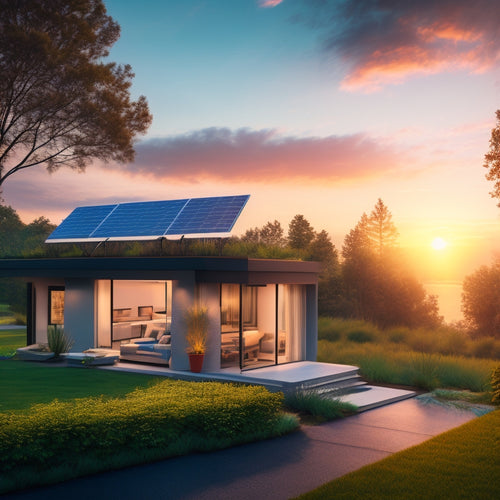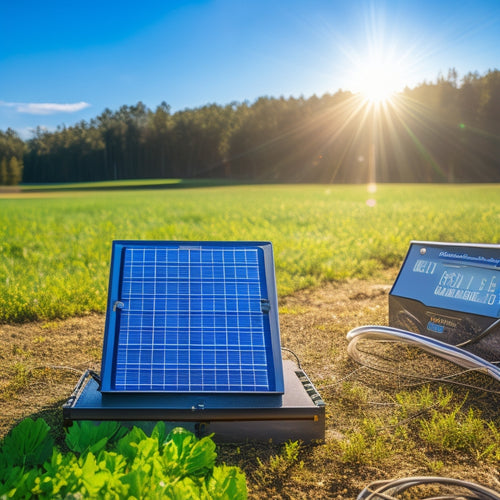
Ground Mounted Solar Panel Kits
Share
You're looking to utilize solar energy while preserving your roof's functionality and aesthetic appeal. Ground-mounted solar panel kits offer a solution, allowing you to maximize energy output while keeping your roof clear of obstructions. With strategic panel placement, you can optimize energy production and reduce reliance on the grid. High-quality aluminum frames guarantee durability, and careful calculation of wattage and voltage requirements guarantees a safe and efficient system. As you investigate these kits, you'll want to take into account tilt angle options, guaranteeing peak energy production while minimizing shading risks. Now, take a closer look at the specifics that will help you make an informed decision.
The Essentials
- Ground-mounted solar panel kits conserve roof space, optimize energy output, and preserve roof functionality and aesthetic appeal.
- These kits enable strategic panel placement for maximum sunlight exposure, increasing energy output by up to 20%.
- Ground-mounted kits reduce reliance on the grid, leading to significant savings, lower energy bills, and a reduced carbon footprint.
- High-quality aluminum frames with rust resistance are crucial for the reliability and durability of ground-mounted kits.
- Accurate wattage calculation and voltage requirement checks ensure a safe and efficient system operation within a compatible voltage range.
Maximize Roof Space Freedom
You maximize roof space freedom by opting for ground mounted solar panel kits, which allow you to conserve important roof real estate while optimizing energy output.
With rising energy costs and environmental concerns, a flexible and scalable solution such as the Renewable Energy Solutions is crucial.
This approach allows you to allocate roof space for other essential components, such as ventilation systems or skylights, without compromising your solar energy goals.
Roof Space Conservation
Optimizing roof space is essential for homeowners who want to utilize the power of solar energy without compromising their roof's functionality. You want to guarantee that your solar panel installation doesn't obstruct your roof's purpose, whether it's providing shade, supporting skylights, or maintaining its aesthetic appeal.
By conserving roof space, you'll have the freedom to use your roof as you see fit. Additionally, traditional rooftop solar panel installations may not be the most feasible or efficient solution, especially when dealing with limited rooftop space.
Ground-mounted solar panel kits offer a solution to this problem, allowing you to keep your roof clear of obstructions while still capitalizing on solar energy. Aesthetically, you might want to avoid cluttering your roof with solar panels, especially if you have a unique or historic roof design.
Installation challenges, such as complex roof angles or multiple skylights, can also be overcome with ground-mounted systems. By choosing a ground-mounted solar panel kit, you'll have more control over the installation process and can ascertain that your solar panels are installed in a way that respects your roof's functionality and aesthetic considerations.
With roof space conservation, you can enjoy the benefits of solar energy without sacrificing your roof's freedom.
Optimize Energy Output
With ground-mounted solar panel kits, maximizing roof space freedom enables homeowners to optimize energy output by strategically placing panels in areas that receive the most sunlight. This allows you to utilize the full potential of your solar panel system, generating more power and reducing your reliance on the grid.
To further optimize energy output, consider implementing solar tracking technology. This feature adjusts the angle and orientation of your panels to follow the sun's movement, ensuring maximum energy absorption throughout the day.
| Optimization Strategy | Benefits |
|---|---|
| Solar Tracking | Increases energy output by up to 45% |
| System Maintenance | Reduces energy losses due to dirt and debris |
| Panel Placement | Maximizes energy production by up to 20% |
| Monitoring and Analytics | Identifies performance issues and optimizes system performance |
Increased Energy Independence
By installing a ground-mounted solar panel kit, you'll reduce your reliance on the grid and won't be held back by limited roof space.
With affordable solar panel installations from companies like Sunrun and Tesla Solar, you can maximize your savings and reduce high energy bills.
You'll capture local energy and benefit from a more consistent and predictable power supply.
This means you'll have more control over your energy costs and won't be subject to unexpected rate hikes.
Reduce Reliance on Grid
Your energy bills are riddled with uncertainty, thanks to the grid's fluctuating rates and unpredictable outages. By investing in a ground-mounted solar panel kit, you'll reduce your reliance on the grid and gain more control over your energy costs.
With solar power, you'll enjoy predictable energy savings and a reduced carbon footprint. Here's a breakdown of the benefits:
| Benefits | Description |
|---|---|
| Energy Savings | Reduce your energy bills by up to 50% with solar power |
| Grid Alternatives | Explore your energy sources and decrease dependence on the grid |
| Sustainable Practices | Contribute to a cleaner environment with renewable energy |
Harness Local Energy
Ground-mounted solar panel kits enable you to make use of local energy, increasing your energy independence and reducing reliance on the grid.
This means you'll have more control over your energy consumption and production, allowing you to make informed decisions about your energy usage. By tapping into local energy, you'll be less dependent on the grid, which can be unpredictable and prone to outages.
You can take advantage of local incentives and community programs that promote renewable energy.
Many states and local governments offer rebates, tax credits, and other incentives to encourage the adoption of solar energy. Additionally, community programs like net metering and community solar gardens allow you to share the benefits of solar energy with your neighbors.
Aluminum Frame Durability Matters
When you're selecting a ground-mounted solar panel kit, you're probably thinking about the panels themselves, but you shouldn't overlook the aluminum frame that holds them in place.
The frame's rust resistance is vital, as it'll be exposed to the elements, and even a small amount of corrosion can compromise the entire structure.
With rooftop solar installations in mind, you'll want to guarantee the frame is designed to maximize yard space and reduce visual clutter.
You'll want to confirm the frame is made from high-quality aluminum that's anodized or coated to prevent corrosion, and that it's designed with structural integrity in mind to withstand various environmental conditions.
Frame Rust Resistance
Corrosion-resistant aluminum frames are the backbone of a reliable ground-mounted solar panel kit, and their durability is vital to withstanding harsh outdoor environments. You want to make certain your frame can resist rust and corrosion, especially in coastal or high-humidity areas.
| Frame Coating Option | Rust Resistance | Maintenance Requirements |
|---|---|---|
| Anodized | Excellent | Low |
| Powder Coated | Good | Medium |
| Galvanized | Fair | High |
| Epoxy Coated | Good | Low |
| Uncoated | Poor | High |
When selecting a frame, consider the coating options above. Anodized frames offer excellent rust resistance and require minimal maintenance. Powder-coated frames are a good option, but may need occasional cleaning. Galvanized frames are a more budget-friendly option, but require regular maintenance to prevent rust. Epoxy-coated frames offer a balance between rust resistance and maintenance requirements. Avoid uncoated frames, as they're more prone to rust. Regular cleaning and inspections are essential to extending the lifespan of your frame. By choosing the right frame coating and following frame maintenance tips, you'll make certain your ground-mounted solar panel kit remains reliable and efficient for years to come.
Structural Integrity Matters
Your frame's structural integrity is just as important as its rust resistance. When it comes to ground-mounted solar panels, a sturdy frame is essential to guarantee the system's overall performance and longevity.
You need a frame that can withstand various environmental factors, including wind resistance and foundation stability. A well-designed frame should be able to absorb wind loads, snow loads, and other external forces without compromising the solar panels' performance.
The foundation stability of your frame is also vital, as it affects the entire system's stability and prevents it from shifting or toppling over. A stable foundation guarantees that your solar panels remain securely in place, even in harsh weather conditions.
When selecting a ground-mounted solar panel kit, look for frames made from high-strength, corrosion-resistant materials like aluminum. Confirm the frame's design takes into account local building codes, wind zones, and soil conditions.
Check Wattage and Voltage
When selecting a ground mounted solar panel kit, you'll need to calculate the wattage requirements based on factors like your energy usage, roof size, and local solar irradiance.
This calculation will help you determine the number of panels and their individual wattage ratings. As you consider your energy storage solutions, it's crucial to integrate a residential solar power system that meets your specific needs.
Additionally, you'll need to verify the voltage requirements of your system are compatible with your inverter and electrical infrastructure.
Wattage Calculation Factors
Determining the correct wattage for your ground-mounted solar panel kit requires careful evaluation of several key factors.
You'll need to assess your energy needs, bearing in mind the appliances and devices you want to power. Additionally, you should reflect on the panel efficiency, which affects how much energy your system can generate per hour of sunlight.
Solar orientation is another significant factor. The direction and angle of your panels impact the amount of energy they can produce. Ideally, your panels should face south, at an angle between 30 and 40 degrees, to maximize energy output.
You'll also need to consider any shading or obstructions that might affect your system's performance.
When calculating wattage, you'll want to examine the peak sun hours (PSH) in your area. PSH measures the amount of sunlight your location receives during the peak sun hours of the day.
Voltage Requirements Check
In conjunction with calculating the ideal wattage, it's essential to perform a voltage requirements check to confirm your ground-mounted solar panel kit operates within a safe and efficient range. This guarantees that your system can handle the maximum voltage output of your solar panels and prevents damage to your equipment.
There are two primary voltage types to evaluate: DC (direct current) and AC (alternating current). DC voltage is generated by your solar panels, while AC voltage is used by your home or business. You'll need to verify that your system can handle the voltage output of your solar panels and convert it to AC voltage safely and efficiently.
| Voltage Type | System Compatibility |
|---|---|
| 12V DC | Suitable for small systems and off-grid applications |
| 24V DC | Ideal for medium-sized systems and grid-tie inverters |
| 48V DC | Compatible with large systems and commercial applications |
| 120/240V AC | Standard for residential and commercial grid-tie systems |
| 208/240V AC | Typically used for commercial and industrial applications |
Lower Tilt Angle Options
When you're considering lower tilt angle options for your ground-mounted solar panel kit, you'll need to assess potential shading issues.
Since a lower tilt angle can increase the risk of shading from surrounding objects, you'll want to carefully evaluate the site's surroundings to guarantee peak energy production.
Shading Considerations
Optimize your ground-mounted solar panel kit's performance by considering shading effects, as even partial shading can greatly reduce energy output.
When conducting a shading analysis, you'll identify potential obstructions like trees, buildings, or terrain features that can cast shade on your solar panels. Since sunlight exposure varies throughout the day and year, you'll need to assess the shading effects during different periods.
To mitigate shading issues, consider the following strategies.
First, choose a location with minimal obstructions. If that's not possible, adjust the panel's tilt angle to minimize shading. For instance, a lower tilt angle can help reduce shading from trees or buildings to the south.
Additionally, consider using a tracking system that follows the sun's movement to maximize energy output.
Frequently Asked Questions
Can I Install a Ground-Mounted Solar Panel Kit Myself?
You can install a solar panel kit yourself, but it's essential to weigh DIY considerations, guaranteeing you're comfortable with electrical work and roof penetrations; research installation tips, like evaluating your site's solar irradiance and local building codes, to secure a successful project.
How Do I Ensure the Kit Is Compatible With My Local Grid?
Did you know that 99% of US homes are compatible with solar power? To confirm your system's grid connection, check your local energy regulations, verifying voltage, frequency, and interconnection requirements, and consult with your utility company to secure a seamless integration.
Are Ground-Mounted Solar Panels More Expensive Than Roof-Mounted?
When comparing installation costs, you'll find ground-mounted systems generally pricier than roof-mounted ones due to additional hardware and labor requirements, but their efficiency comparison often favors ground-mounted systems, giving you more freedom to optimize energy output.
Can I Mix and Match Components From Different Kits?
As you traverse the vast solar terrain, you're free to pick and choose like a skilled chef selecting ingredients; however, mixing and matching components from different kits can be a recipe for disaster, compromising component compatibility and ultimately solar system efficiency.
Do Ground-Mounted Solar Panels Require More Maintenance?
You'll find that solar panels, in general, require less maintenance than traditional energy sources, but you'll still need to clean them regularly to maximize efficiency, with maintenance frequency and cleaning techniques varying depending on your location and system design.
Final Thoughts
You've weighed the benefits of ground-mounted solar panel kits: maximizing roof space freedom, increasing energy independence, and leveraging durable aluminum frames. You've checked the wattage and voltage to guarantee a seamless integration. And, you've considered lower tilt angle options for ideal energy harvesting. Now, research suggests that ground-mounted systems can increase property value by up to 17% - a theory proven true by a study from the National Renewable Energy Laboratory. With these kits, you're not only generating clean energy but also enhancing your property's worth.
Related Posts
-

Advantages of Solar Generating Systems Over Traditional Energy
Solar generating systems provide several key advantages over traditional energy sources. You'll experience lower long...
-

The Future of Residential Energy Storage
The future of residential energy storage looks promising and cost-effective for you. With lithium-ion battery prices ...
-

Choosing the Right Solar Power Charge Controller
Choosing the right solar power charge controller is crucial for maximizing energy efficiency and extending battery li...


